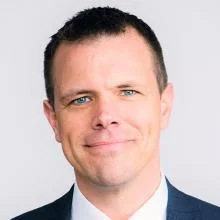Many CIOs have told us that the chance to be a coach and mentor is among the most rewarding aspects of their job. The right question or well-timed advice can have an outsized impact on someone’s life, shaping their career choices for years to come.
We asked award-winning CIOs to share a key piece of advice or thought-provoking question that they use to guide mentees in their career. If you are looking to play a stronger coaching role for individuals on your team, consider these tips from ORBIE Award winners in Alabama and Boston.
1. Make your aspirations known

Don Anderson, CIO, Tiger Global Management: I encourage people to make their aspirations known. It is perfectly ok to say you want to move towards a more senior role, explore leadership opportunities, or change to a different specialty within IT. We are lucky within IT; there are so many opportunities to put your toe in the water to see if it’s the right fit before going all in. And often, it’s easier to test the waters in your existing company versus assuming you have to make a move to another.
[Get advice from Don Anderson on leading transformation. Read his article: Digital transformation: How to beat the challenges of a federated organization ]
2. Raise your hand

Brooke Forbes, CIO, Head of Technology and Agile Business Services, Fidelity Investments: One of the most powerful and enduring pieces of advice from my time as both a mentor and mentee is: raise your hand and inspire others to do the same. It may sound simple, but it takes courage to raise your hand when you have a question and want to better understand something, when you see a problem and want to help solve it, or when you want to take on a stretch assignment or new challenge. In any of these scenarios, raising your hand can help you meet new people, expand your network, extend your brand, show others your curiosity and agility, demonstrate your capabilities and willingness to take risks and try things, and ultimately create more opportunities to develop and grow.
Raising your hand is more than just having a seat at the table – it’s about showing up, being present, actively participating and contributing, and choosing to lead every day, regardless of your role. I really believe you get the most out of raising your hand when you bring your authentic self to work and commit to a mindset of continuous learning, listening, and improvement. Creating an inclusive environment that empowers others to embrace the same attitude builds a truly special workplace.
3. You are not alone

Adam Wasylyshyn, CIO, Insulet Corporation: Early on in your career, as an individual contributor, your focus is all about you. As a technologist, you are taught about how important it is to develop rigor around process, systems, and developing deep technical expertise. What is sometimes overlooked is the power of teamwork and collaboration in achieving your goals.
Once you shift into more of a leadership mindset, you realize it is all about the team. You begin to realize the power of focusing a group of individuals on a common, shared goal. You also realize that as a team, you are stronger together than you are apart.
As you ascend into a senior leadership role, you learn how to put it all together. You learn to use the skills, experience, and experience of your teammates, and you get to see firsthand how impactful a high performing team can be.
My key piece of advice: You can do good things on your own, but you can do exceptional work with the help of others. And exceptional leaders learn how to change the game to get better outcomes than the competition.
[ Related read: IT leadership: 6 questions mentors should ask mentees ]
4. Be your own advocate

Ryan Loy, CIO, EBSCO Industries: Most often I find individuals are reluctant to self-promote or ask for opportunities. It’s important to remember that you must be your own advocate and seek out areas where you can grow. Don’t expect opportunities to just come your way. Take charge.
[ For more tips on coaching, read: IT leadership: 6 questions mentors should ask mentees ]
5. Reflect on passion and pride

Lisa Stump, SVP & CIO, Yale New Haven Health: Mentorship is one of the most rewarding parts of my life and I have personally benefited from being both a mentor and a mentee. Some of the most impactful questions posed by my mentors to me are now the key questions that I use to engage with mentees: What are you passionate about? What is it you want to do? When you stand up to give your retirement speech, what do you want to be able to say you are proud of?
These questions were asked of me by two of my mentors at two different pivotal points in my career. They caused me to pause and discover that I had been building my career by doing what I thought was the usual path or what was expected of me. Reflecting on my passion and what gave me pride caused me to shift my career into healthcare IT. I reflect on those questions often, and they continue to keep me on a path that is grounded in my values. I find these questions really pivotal in talking with mentees for the same reasons. When you can pause and really focus on your passion and what gives you pride, you identify your strengths and what gives you energy, and you find reward in what you do. And that is what it’s all about.
6. Make sure you love what you do

Greg Solomon, Director of IT, Bank Independent: “How happy are you with your current role or with the work you are doing?” If someone is not happy within their current roles or responsibilities, they will not perform well enough to improve their career. My philosophy is you must really love what you’re doing to succeed in your career. If you get that question answered first with any mentee, then you can have the proper conversation around their career.
7. Get specific on the problems you want to solve

Chad Wright, CIO, Boston Dynamics: As an adjunct instructor at a local university, I work with many students who are just starting out in their careers. Like my stakeholders at Boston Dynamics starting a new project, I like to pose the question. “What problem are you trying to solve?” I find that this approach will ground both of us in a conversation about what is most important to the mentee and what they hope to get out of the engagement.
If they are looking to build their network, I stress the idea of “polite persistence,” where they can use their favorite social networking platform to identify companies and individuals to whom they have an affinity, such as alumni that work in roles they aspire to know more about. I advise them not to ask for a job – at least not until they build a relationship. Instead, I advise them to ask for a 15-minute conversation to learn more about them and what they do every day. People love to talk about themselves! It’s a great way to learn more about the company and the role, and if they’re lucky, they’ll make a new friend and networking contact at a minimum.
If the mentee is looking for assistance with their job interviews, I advise them to create a portfolio – much like a photographer or artist might have a portfolio of their work to demonstrate their expertise. There are many tools that make it easy to store and share code samples, for instance. Having a well-prepared portfolio is one sure way to help candidates stand out from the crowd.
[ Read next: What's the difference between a manager and a coach? ]





